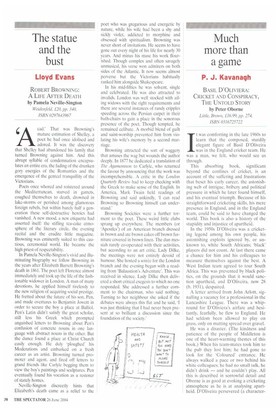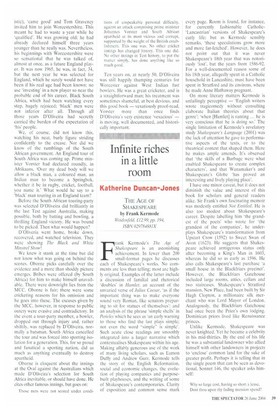Much more than a game
P. J. Kavanagh
BASIL D'OLIVIERA: CRICKET AND CONSPIRACY, THE UNTOLD STORY by Peter Oborne Little, Brown, 116.99, pp. 274, ISBN 0316725722 It was comforting in the late 1960s to learn that the composed, sturdily elegant figure of Basil D'Oliveira was in the England cricket team. He was a man, we felt, who would see us through.
This absorbing book, significant beyond the confines of cricket, is an account of the suffering and frustrations that beset his early career, the astonishing web of intrigue, bribery and political pressure in which he later found himself, and his eventual triumph. Because of his straightforward cricketing skills, his mere presence in England, and in the England team, could be said to have changed the world. This book is also a history of the stupidity and injustice of apartheid.
In the 1950s D'Oliveira was a cricketing legend among his own people, his astonishing exploits ignored by, or unknown to, white South Africans; 'black' players did not count. At last there came a chance for him and his colleagues to measure themselves against the best. A West Indian team agreed to tour South Africa. This was prevented by black politics, on the grounds that it would sanction apartheid, and D'Oliveira, now 28 (b. 1931), despaired. A letter arrived from John Arlott, signalling a vacancy for a professional in the Lancashire League. There was a whipround for D'Oliviera's airfare and hesitantly, fearfully, he flew to England. He had seldom been allowed to play on grass, only on matting spread over gravel.
He was a disaster. (The kindness and patience of the people of Middleton is one of the heart-warming themes of this book.) When his team-mates took him to the pub they lost him; he had gone to look for the 'Coloured' entrance. He always walked a pace or two behind his white colleagues; he had no small talk, he didn't drink — and he couldn't play. All this is described in sorrowful detail and Oborne is as good at evoking a cricketing atmosphere as he is at analysing apart I held. D'Oliveira persevered (a character istic), `came good' and Tom Graveney invited him to join Worcestershire. This meant he had to waste a year while he 'qualified'. He was growing old; he had already declared himself three years younger than he really was. Nevertheless, his beginnings with Worcestershire were so sensational that he was talked of, almost at once, as a future England player. It was now 1965, he was, in fact, 34, but the next year he was selected for England, which he surely would not have been if his real age had been known; no use 'investing' in a new player so near the probable end of his career. Black South Africa, which had been watching every step, hugely rejoiced; 'black' men were not inferior after all. Through all those years D'Oliveira had secretly carried the burden of the expectation of 'his' people.
We, of course, did not know this, watching his neat, burly figure striding confidently to the crease. Nor did we know of the rumblings of the South African government. An England tour of South Africa was coming up. Prime minister Vorster had declared roundly, in Afrikaans, Over my dead body will we allow a black man, a coloured man, an Indian man to become a Springbok, whether it be in rugby, cricket, football, you name it.' What would he say to a 'black' man touring in an England team?
Before the South African touring-party was selected D'Oliveira did brilliantly in the last Test against Australia, making possible, both by batting and bowling, a thrilling England victory. He was bound to be picked. Then what would happen?
D'Oliveria went home, broke down, recovered, and watched television, They were showing The Black and White Minstrel Show!
We knew it stank at the time but did not know what was going on behind the scenes. Oborne picks carefully over the evidence and a more than shoddy picture emerges. Bribes were offered (by South Africa) for him to make himself unavailable. There were downright lies from the MCC. °borne is fair; there were some cricketing reasons for his omission and he goes into these. The excuses given by the MCC, however, in response to public outcry were evasive and contradictory. In the event a tour-party member, a bowler, dropped out through injury and, rather shiftily, was replaced by D'Oliveira, normally a batsman. South Africa cancelled the tour and was forced into sporting isolation for a generation. This, for so proud and fanatical a sporting nation, did as much as anything eventually to destroy apartheid.
°borne is eloquent about the innings at the Oval against the Australians which made D'Oliveira's selection for South Africa inevitable, or should have done. He cites other famous innings, but goes on:
Those runs were not scored under condi tions of unspeakable personal difficulty, against an attack comprising prime minister Johannes Vorster and South African apartheid at its most vicious and corrupt, supported by the weight of the British establishment. This one was. No other cricket innings has changed history. This one did, No other innings in Test history, to put the matter simply, has done anything like so much good.
Ten years on, at nearly 50, D'Oliveira was still happily thumping centuries for Worcester against West Indian fast bowlers. He was a great cricketer, and is a straightforward man; his treatment was sometimes shameful, at best devious, and this good book — vexatiously proof-read, Vorster more than once finds D'Oliveira's very existence `vexacious' — is moving, well documented, and historically important.



































































 Previous page
Previous page